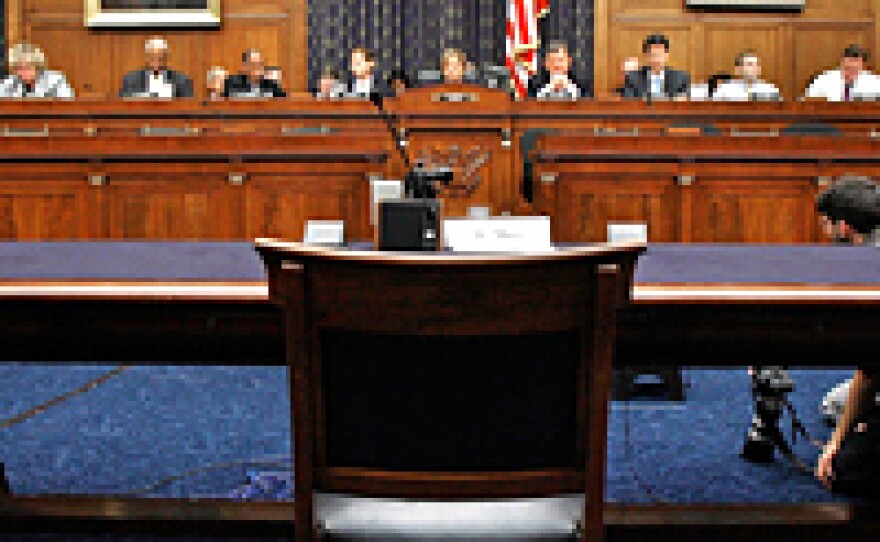
A House panel began clearing the way Thursday for contempt proceedings against former White House counsel Harriet Miers after she obeyed President Bush and skipped a hearing on the firings of eight federal prosecutors.
Addressing the empty chair where Miers had been summoned to testify, Rep. Linda Sanchez ruled that the president's position that his former adviser does not have to testify before Congress because of executive privilege is out of order.
Dividing along party lines, the panel voted 7-to-5 to reject Miers' assertion that she had no legal obligation to appear in response to a subpoena.
The next step would be for the full Judiciary Committee to issue a finding that Miers, Bush's longtime friend and former Supreme Court nominee, was in contempt. Ultimately, the full House would have to vote on any contempt citation.
Miers' lawyer had initially indicated she would at least show up at a hearing about the mass firing of federal prosecutors, but she reversed course after the White House notified her that in its view current and former senior advisers to the president have absolute immunity from being called to testify before a congressional committee.
"Those claims are not legally valid," Sanchez (D-CA) said of the president's position. "Ms. Miers is required pursuant to the subpoena to be here now."
On Wednesday, another former White House aide under subpoena, former political director Sara Taylor, tried to answer some questions before the Senate Judiciary Committee. But Taylor said she could not answer others without breaching either the subpoena or Bush's claim of executive privilege.
After first refusing to answer questions about Bush's possible role in the firings, Taylor later told the Senate Judiciary Committee that she knew of no involvement by the president.
Further, she said, she knew of no wrongdoing by administration officials in the controversy that has hobbled the Justice Department and imperiled Attorney General Alberto Gonzales.
The developments whipped across Washington as part of a broader dispute over the boundaries of Bush's executive power and Congress' oversight duty. Democrats, in control of Congress for the first time in a dozen years, are probing whether the White House ordered the prosecutor firings in ways that might help Republicans in elections.
The Bush administration acknowledges that the firings were clumsily carried out but insists no wrongdoing occurred. Bush has offered to allow his aides, including counselor Karl Rove, Miers and Taylor, to be interviewed by congressional investigators – but only in private and without a transcript.
Democrats on the committees rejected the offer and subpoenaed Miers and Taylor to appear this week, a possible foreshadowing of what's to come for Rove.
In letters dated Tuesday, White House Counsel Fred Fielding told Miers' lawyer that Bush had ordered her to stay away from Thursday's hearing.
"Ms. Miers has absolute immunity from compelled congressional testimony as to matters occurring while she was a senior adviser to the president," Fielding wrote to Miers' lawyer, George T. Manning. "The president has directed her not to appear at the House Judiciary Committee hearing on Thursday, July 12, 2007."
Manning, in turn, notified committee Conyers and Rep. Linda Sanchez (D-CA), chairwoman of the subcommittee on commercial and administrative law.
Conyers had previously said he would consider pursuing criminal contempt citations against anyone who defied his committee's subpoenas.
"A refusal to appear before the subcommittee tomorrow could subject Ms. Miers to contempt proceedings," Conyers and Sanchez, wrote back to Manning. "The subcommittee will convene as scheduled and expects Ms. Miers to appear as required by her subpoena."
At the same time, Senate Judiciary Committee Chairman Patrick Leahy held open the possibility of contempt proceedings against Taylor if she does not answer follow-up questions posed during his hearing Wednesday.
"That's a decision yet to be made," Leahy said.
Taylor, eager to exhibit a willingness to answer questions but refusing to do so on many of them, revealed some details behind the firings.
"I did not speak to the president about removing U.S. attorneys," she said under stern questioning by Leahy (D-VT). "I did not attend any meetings with the president where that matter was discussed."
When asked more broadly whether Bush was involved in any way in the firings, Taylor said, "I don't have any knowledge that he was."
She said she did not recall ordering the addition or deletion of names to the list of prosecutors to be fired. Taylor said she had no knowledge that Bush was involved in the planning of whom to
fire, an assertion that echoed previous statements by Attorney General Gonzales, his former chief of staff, Kyle Sampson, and Deputy Attorney General Paul McNulty.
Taylor disputed Sampson's account that she wanted to avoid submitting a new prosecutor, Tim Griffin, through Senate confirmation.
"I expected him to go through Senate confirmation," Taylor said under questioning by Sen. Dianne Feinstein (D-CA).
Taylor also issued a stiff defense of her colleagues in the Bush administration.
"I don't believe there was any wrongdoing by anybody," she said.
On almost every question, Taylor hesitated as she considered whether answering would cross Bush's order to not reveal internal White House deliberations.
"I'm trying to be consistent and perhaps have not done a great job of that," Taylor said. "I have tried."
From NPR reports and The Associated Press
Copyright 2022 NPR. To see more, visit https://www.npr.org. 9(MDAzMjM2NDYzMDEyMzc1Njk5NjAxNzY3OQ001))






